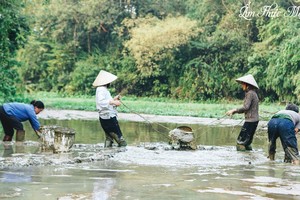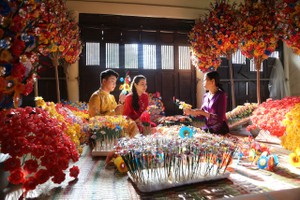
“I want more and more people in the country know about my island like the islands of Phu Quoc, Ly Son and Con Dao,” he says.
When his friends did not know where Phu Quy was on the country’s map, he says he would feel “sad”.
“I was determined to make the island famous. I started writing about the island’s beauty on a website for people who like to travel without using tourist companies and Facebook pages.”
And then he brought several of his friends to the island for a visit and put them up in unused rooms in his house.
Those people went back and told their family and friends about a place that has since been hailed as one of the most beautiful islands in the East Sea by US news site CNN.
High-speed boat services to the island, situated 120km from the resort town of Phan Thiet, began last year.
Not surprisingly, it has become a popular destination for tourists, especially young people.
Gioi says: “The island’s inhabitants are hospitable to tourists. In the past, travelling from the island to the mainland was difficult so they were happy if anyone visited them. The hospitable attitude keeps tourists returning.”
Many young people who want to travel to the island call Gioi to ask for information and book his homestay service. He is one of the first few people to offer homestay on the island.
According to statistics from the island People’s Committee, the number of tourists coming to the island has risen this year. Last year, it received 16,500 visitors, and in the first five months of this year the number was 10,000, including nearly 2,000 foreigners.
Ngo Tan Luc, the committee’s vice chairman, says the homestay services have been developed to provide enough accommodation for tourists, many of them by young locals.
Twenty households have been licensed to provide the services.
“Homestay services help the island develop tourism sustainably and not have adverse impacts on the landscape and environment,” Luc says.
So authorities plan to develop them professionally by getting experts to provide training, he says, adding that young owners have also been trained to become professional tour guides.
Gioi says that following the training, the people providing homestay services have linked up and share guests in case their place is full.
“Sharing helps serve tourists well. Besides traditional fishing and purchase of seafood, tourism and homestay are new occupations for local residents to earn an income.”
Loan of the HCM City University of Sciences and Humanities said tourism is one of the five industries fetching the highest foreign exchange earnings for the country annually, leading to a boom in the accommodation business, especially homestays.
Many young people offer homestay services by taking advantage of unused rooms in their house and offering to tourists who want to stay with locals when travelling.
Some others even rent apartments and houses to tourists, she said.
According to statistics from accommodation-sharing site AirBnB, 25,000 households in the city offered rooms to tourists as of June last year.
The accommodation business accounts for nearly 70 percent of the tourism industry’s revenues, Loan said.
According to the Vietnam National Administration of Tourism, the number of accommodation business establishments in the country increased from 9,080 in 2007 to 25,600, including homestays, in 2017.
The northern region accounted for 45 percent of them, the highest in the country, followed by the central and southern regions.
Phu Quoc Island and the cities of Ha Long, Hanoi, Hue, Nha Trang, Phan Thiet, Da Nang and Ho Chi Minh City have the highest number of such establishments in the country.
At a recent conference in HCM City on developing tourism, Prime Minister Nguyen Xuan Phuc said community-based tourism, including homestays, should be encouraged by local authorities around the country because it could help develop tourism in the most sustainable manner.
Local people have the deepest understanding of culture and history, and would be the best tour guides, he added.
























